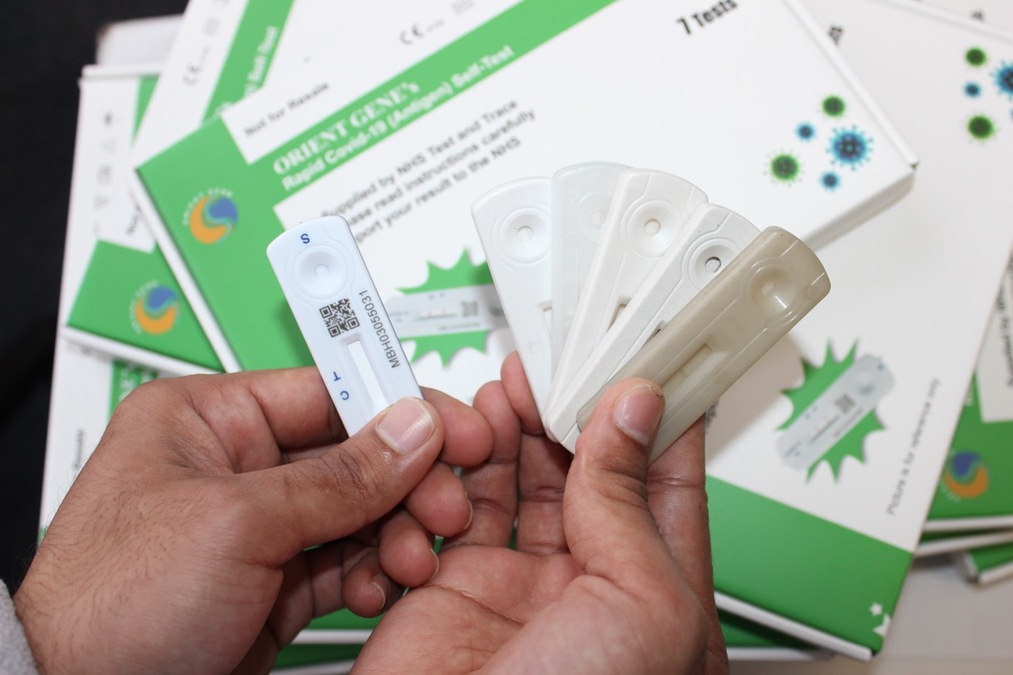Published:

Heriot-Watt academics have used discarded chewing gum and other waste plastics to produce prototype lateral flow tests (LFTs) with the aim of cutting medical waste globally.
Professor Maïwenn Kersaudy-Kerhoas, a professor in microfluidic engineering in the School of Engineering and Physical Sciences, has produced five devices made from a range of emerging sustainable materials.
Over four billion lateral flow tests are manufactured annually using around 16,000 tonnes of plastics. Sorting and potential contamination issues mean very few are recycled. Meanwhile the market for LFTs is set to grow from $43 billion in 2022 to $72bn by the end of 2024.
In addition to old chewing gum, the team used sustainably derived plastics including old fridge parts made from High Impact Polystyrenes which are 100% recyclable plastic; Limex, a material derived from limestone with 50-80% calcium carbonate in the final product; Terralene, bio-compounds based on polyethylene made from renewable raw materials; and Bio-flex, a biodegradable and compostable plastic.
LFTs entered the public consciousness during the Covid pandemic but they are also used to identify Strep A, Pre-eclampsia, pregnancy, and mosquito-borne diseases. Together with masks, they are a visible part of the growing medical waste challenge.
Professor Maïwenn Kersaudy-Kerhoas, academic co-lead at Heriot-Watt University’s new Global Research Institute in Health & Care Technologies, said:
If we can make LFTs out of sustainable materials and without the use of fossil fuels in their production, we can save between 30 and 80% of carbon emissions that virgin plastic processing produces.
We’ve now had approval to test these prototypes, making sure they function as well as the existing ones, particularly regarding the flow of liquid on the testing strip. Along with demonstrating feasibility in their practical application, these new devices help to support a wide ranging discussion around healthcare sustainability in general and how we might develop a circular economy through potential changes in procurement and legislation
Sustainable plastics are not the only way as there are paper-based solutions in development. But they might take a while to be produced at scale as manufacturers will need significant investment in new production lines. After rigorous scientific, economical, and regulatory investigations, recycled plastics could be used with existing equipment and a quick win for some products like LFTs.
Professor Kersaudy-Kerhoas is one of the academics leading a new global research institute in Health and Care Technologies at Heriot-Watt University.
Steve McLaughlin, deputy principal for research and impact at Heriot-Watt University and the director of Health & Care Technologies, said:
Maiwenn and her team have been passionate about reducing medical waste throughout their careers and the figures make it obvious why this is such an urgent issue.
“The mission of the new Global Research Institute is to work closely with industry and sector partners to deliver innovative, sustainable and use-inspired solutions to help solve global health challenges in a spirit of co-creation. The work Maiwenn is doing on sustainable LFTs is exactly the sort of project we want to support and we have the world-leading research and engineering capabilities here at Heriot-Watt to do it.
The sustainable LFTs project is part of a collaboration with social scientists at the University of Edinburgh and is part-funded by the DIADEV project (Investigating the Design and Use of Diagnostic Devices in Global Health), funded by the European Research Council under the European Union’s Horizon 2020 research and innovation programme.
Professor Alice Street from the University of Edinburgh and principal investigator of the DIADEV project, said:
LFTs are used globally to test for a growing number of diseases and are especially important in low-resource settings but not enough attention has been paid to the plastic waste they generate.
This project brought together social sciences research showing the impact of LFT waste around the world with innovative approaches in biomedical engineering to create long overdue solutions to the growing problem of medical waste.
Sustainability was also factored into the manufacture of the prototype LFTs with the academic team working with innovative English moulding company, Great Central Plastics.
Kiron Phillips from Great Central Plastics said:
We take pride in our sustainable manufacturing processes, and we adopt this ethos across all levels of our business. This collaboration highlights our commitment to cutting-edge research and development. By championing sustainable alternatives such as Gum-tec and Limex, we not only mitigate environmental impact but also pioneer a shift in the industry, setting a benchmark for responsible production practices.
Anyone interested in collaborating with the Global Research Institute in Health and Care Technologies can contact GRID@hw.ac.uk.